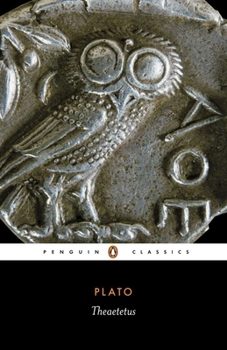Theatetus
Select Format
Select Condition 
Book Overview
Set immediately prior to the trial and execution of Socrates in 399 BC, Theaetetus shows the great philosopher considering the nature of knowledge itself, in a debate with the geometrician Theodorus and his young follower Theaetetus. Their dialogue covers many questions, such as: is knowledge purely subjective, composed of the ever-changing flow of impressions we receive from the outside world? Is it better thought of as "true belief"? Or is it, as...
Format:Paperback
Language:English
ISBN:0140444505
ISBN13:9780140444506
Release Date:August 1987
Publisher:Penguin Publishing Group
Length:272 Pages
Weight:0.50 lbs.
Dimensions:0.6" x 5.1" x 7.8"
Age Range:18 years and up
Grade Range:Postsecondary and higher
Customer Reviews
3 ratings
Founding Epistemology
Published by Thriftbooks.com User , 15 years ago
Plato's Theatetus is considered the originary work of epistemological inquiry. Wittgenstein looked to this dialogue as a major source for epistemological problematics in his later philosophy, and it continues to be studied in the continental tradition as well. Socrates and Theatetus attempt to resolve the problem of defining knowledge-first by examining knowledge as a a mode of perception, then through in investigation of knowledge as correct judgment. Socrates and Theatetus give an account of the true role of 'legein' logos and speech in the final sections of the dialogue. Although nothing is resolved the basic problems of epistemology are formulated, and they remain alive to the present day.
An Early Study of Epistemology
Published by Thriftbooks.com User , 15 years ago
What is knowledge? That is the issue taken up in "Theaetetus", this dialogue from ancient Greece which is one of the seminal investigations of epistemology, the study of knowledge. In the dialogue, Socrates, Theodorus, and Theaetetus examine whether everyone's individual perceptions can be regarded as knowledge, or if knowledge must consist of either a true belief or a true belief plus a rational account. The interlocutors do not reach a definitive conclusion concerning what knowledge is, but the dialogue is still well worth reading in the English-speaking world in the early twenty-first century, a place and time in which it is hotly debated whether truth and knowledge are absolute or relative. The final half of this volume is an interpretive essay by Robin Waterfield that discusses the dialogue and its implications, in many places comparing "Theaetetus" with other Platonic works.
The Most Sophisticated Translation of this Great Text
Published by Thriftbooks.com User , 20 years ago
Plato's Theaetetus is the first dialogue in a trilogy, (the other two dialogues being the Sophist and the Statesman). The Theaetetus focuses mostly on a conversation between Theaetetus and Socrates about the nature of knowledge. Their discussion goes through a long "immanent critique" of the notion that knowledge is immediate sensory givens, and then looks at the question whether the supplementation of judgment will be sufficient to explain knowledge. This dialogue also contains Socrates famous portrayal of himself as a midwife and much more. It is a quite difficult but essential text for any study of ancient philosophy.This translation in particular is the one I use when I teach this work. It is quite hard to read, so a first-time student who is approaching this on his or her own might be better off using the translation published by Hackett (Levett/Burnyeat translation) or perhaps Cornford's translation, but the serious student should definitely turn to Benardete's translation. This translation is the one I favour because it is the best at allowing one to see in English what the Greek original is like. Plato's own language is very subtle and much of the value--philosophical and otherwise--of the work is to be found in exploration of the complexities of his language (it's allusions, ambiguities, etc.). Benardete's translation is hard to read because it aims to capture these complexities of the language rather than to make something that flows simply in English. This translation will allow you to get closer to reading Plato than any of the others that I know of.Benardete also has extremely helpful notes and commentary at the end of his text (which are sometimes rather cryptic, which seems suitable to a Platonic text). As a whole, this book will allow the serious study of Plato an excellent opportunity to *think* about the dialogue. I recommend it very highly.






